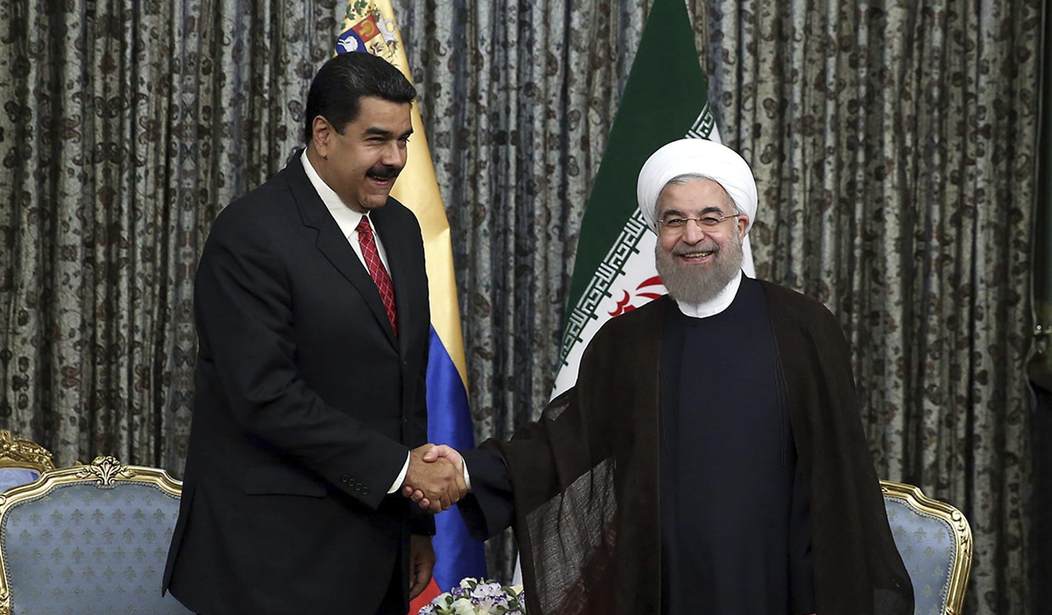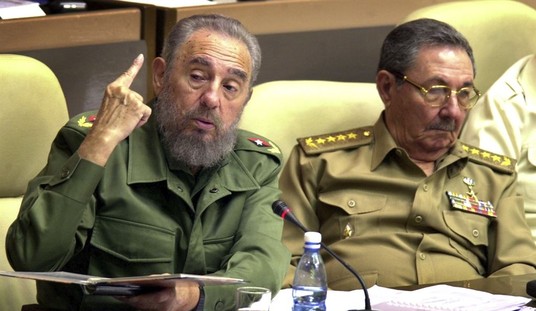One of the underappreciated aspects of the crisis in Iran is its linkage with Venezuela. This collapsing Caribbean nation has a geostrategic alliance with embattled Iran. Some aspects are financial. Venezuela is relying on Iran and Syria to pull it out of the economic mire. “Facing potentially debilitating oil sanctions from the Trump administration, the Caracas government is searching desperately for new ways to get its most valuable commodity — oil — to awaiting buyers. … The Venezuelan government is working with Iran and Syria to start construction this year on a new refinery in Syria that will process up to 140,000 barrels of oil per day, according to an announcement by Iran’s Research Institute of the Petroleum Industry.”
Other ties are military. Caracas closely coordinated with Iran’s foreign legion, Hezbollah, to create a dual-purpose criminal/terror network in the Americas whose primary target was the USA. What happens to this empire if Hezbollah falls from favor at home?
In its determination to secure a nuclear deal with Iran, the Obama administration derailed an ambitious law enforcement campaign targeting drug trafficking by the Iranian-backed terrorist group Hezbollah, even as it was funneling cocaine into the United States, according to a POLITICO investigation. …
As a result, the U.S. government lost insight into not only drug trafficking and other criminal activity worldwide, but also into Hezbollah’s illicit conspiracies with top officials in the Iranian, Syrian, Venezuelan and Russian governments — all the way up to presidents Nicolas Maduro, Assad and Putin, according to former task force members and other current and former U.S. officials.
These links mean that risks now rising in each nation feed into the other. Like bankrupts who have guaranteed each other’s scams, as one declines, it will pull the other down. Iran’s woes increase Venezuela’s — and vice versa. But the chain of causality doesn’t end there. North Korea is also suspected to be part of an internationally distributed WMD program, where Iran takes the lead in missile development and North Korea assumes the responsibility for nuclear warhead design and vehicle testing.
This means unrest in Tehran brings sleepless nights in Pyongyang. The positive side of these linkages is that Kim Jong Un’s recent overtures to Seoul may be driven in part by the worry that his missile partner may go belly up. But on the negative side, it also means that applying sanctions against one have a ripple effect on the other. The overall risk is greater than the sum of the individually distressed countries.
Putin understands this. He knows that to save one, he has to find a way of evading the sanction system as a whole. The New York Times reports:
Russian and Venezuelan officials are hoping virtual currencies can help their countries make an end run around American sanctions.
Both governments, with ambitions to create state-sponsored cryptocurrencies, are looking to take advantage of the promise that Bitcoin introduced to the world financial system: a new kind of money and financial infrastructure, outside the control of any central authority, particularly the United States.
The danger and opportunity for the Trump administration — it’s a two-sided coin — is that the entire Venezuela-Iran-North Korea axis could suddenly take off in an unpredictable direction. Push down in Tehran and Pyongyang may act up. There’s enough complexity in the system to make it difficult to manage. The liberal punditry is finally realizing that you can’t predict the future. But that is exactly what they based the Obama-Iran deal upon in the first place: a scenario that never came true. Now they warn: we don’t know anything about Iran!
Even events from outside the axis could ricochet around the system. Recently Senator Rand Paul tweeted: “I’m introducing a bill to end aid to Pakistan in the coming days. My bill will take the money that would have gone to Pakistan and put it in an infrastructure fund to build roads and bridges here at home.” Could a fall in Pakistan’s fortunes affect Venezuela? The seemingly domestic issue of fracking had unappreciated international effects in 2015: it cascaded through Russia, Iran, Venezuela and Saudi Arabia.
Now CNN predicts America might be oil king of the world. What could happen? 2018 could be an interesting year.
Follow Wretchard on Twitter
For a list of books most frequently purchased by readers, visit my homepage.
Support the Belmont Club by purchasing from Amazon through the links below.
Books:
The Fleet at Flood Tide: America at Total War in the Pacific, 1944-1945, by James D. Hornfischer. From the historian who has been acclaimed as “doing for the Navy what popular historian Stephen Ambrose did for the Army,” here is an unprecedented account of the extraordinary World War II air, land, and sea campaign that brought the U.S. Navy to the apex of its strength and marked the rise of the United States as a global superpower.
The Storm Before the Storm: The Beginning of the End of the Roman Republic, Author Mike Duncan brings to life the bloody battles, political machinations, and human drama that set the stage for the fall of the Roman Republic. Chronicling the years 146-78 BC, he showed how, abandoning the ancient principles of their forbears, men like Marius, Sulla, and the Gracchi brothers set dangerous new precedents that would start the Republic on the road to destruction and provide a stark warning about what can happen to a civilization that has lost its way.
Grant, by Ron Chernow. This book is a grand synthesis of painstaking research and literary brilliance that makes sense of all sides of Grant’s life, explaining how this simple Midwesterner could at once be so ordinary and so extraordinary. Named one of the best books of the year.
Leonardo da Vinci, by Walter Isaacson. This biograpy of history’s most creative genius is based on thousands of pages from Leonardo’s astonishing notebooks and new discoveries about his life and work. Isaacson weaves a narrative that connects his art to his science and shows how Leonardo’s genius was based on skills we can improve in ourselves, such as passionate curiosity, careful observation, and an imagination so playful that it flirted with fantasy.
For a list of books most frequently purchased by readers, visit my homepage.
Did you know that you can purchase some of these books and pamphlets by Richard Fernandez and share them with your friends? They will receive a link in their email and it will automatically give them access to a Kindle reader on their smartphone, computer or even as a web-readable document.
The War of the Words, Understanding the crisis of the early 21st century in terms of information corruption in the financial, security and political spheres
Rebranding Christianity, or why the truth shall make you free
The Three Conjectures, reflections on terrorism and the nuclear age
Storming the Castle, why government should get small
No Way In at Amazon Kindle. Fiction. A flight into peril, flashbacks to underground action.
Storm Over the South China Sea, how China is restarting history in the Pacific
Tip Jar or Subscribe or Unsubscribe to the Belmont Club









Join the conversation as a VIP Member